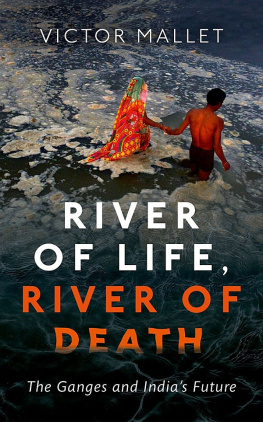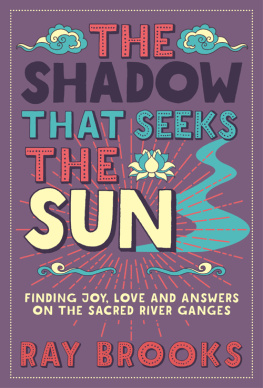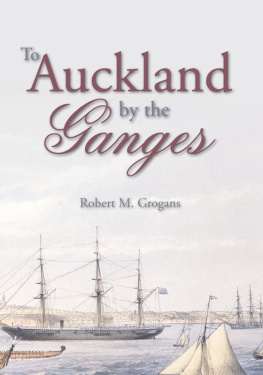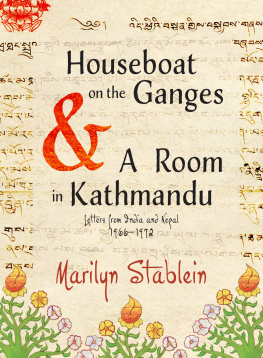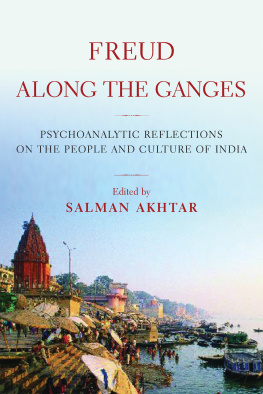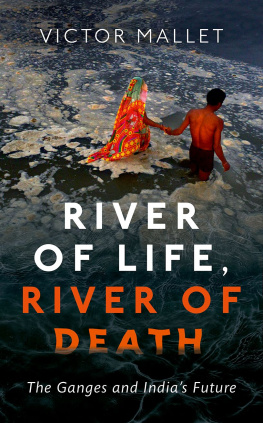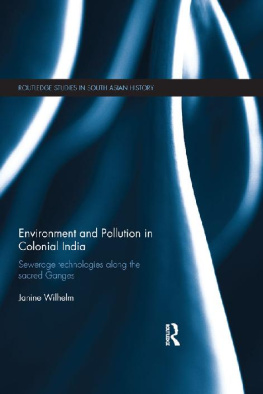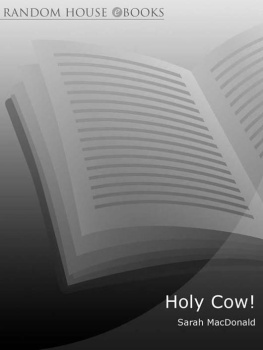Praise for River of Life, River of Death
An extraordinary and fascinating combination of history, geography, environment, politics, religion, and much more. This is a river of unsurpassed significance on the world stage, whose flow and life is traced from the Himalayas to the Sunderbans and the Bay of Bengal.
Nicholas Stern, IG Patel Professor of Economics and Government at LSE
To try and fathom the wonders and follies of India through a river is grand ambitionand Victor Mallet pulls it off!
Gurcharan Das, author of India Unbound and The Difficulty of Being Good.
In prose that is as sanguine and fluid as his subject, Victor Mallets River of Life, River of Death charts the course of the Ganges, the spiritual and material lifeline of northern India, through the vicissitudes of time, space, and the hubris of men. Rich in detail and sparkling with the insight of a trained observer, Mallets chronicle is an engaging and enlightening read.
Shashi Tharoor, Indian MP and author of Inglorious Empire
Masterfully combining fascinating history with acute observation of India today, River of Life, River of Death is brilliantly effective in its central argument - that the threats facing the Gangesfrom pollution, overpopulation, climate change, and often bad policiesare also the severest problems threatening India s progress. Mallet is at times brutally realistic about the prospects for rapid improvement, but passionately concerned that success must eventually be achieved. The result is a splendid and important book.
Adair Turner, Economist and Chair of the Energy Transitions Commission
Victor Mallet demonstrates vividly why India needs to get to grips with the huge challenge of antibiotic resistance...I hope Mr Modis policy advisers read his powerful narrative.
Jim ONeill, economist, inventor of the BRICS acronym and chair of the Review on Antimicrobial Resistance
Victor is one of those rare foreign journalists who not only likes and understands India but, in addition, has the capacity to see its faults as well as impartially assess the efforts its making to correct them. This means his coverage of India is always informed and thought-provoking. Even when sympathetic hes never biased.
Karan Thapar, Indian television anchor
Also by Victor Mallet
The Trouble with Tigers: The Rise and Fall of South-East Asia

Great Clarendon Street, Oxford, ox2 6dp, United Kingdom
Oxford University Press is a department of the University of Oxford.
It furthers the Universitys objective of excellence in research, scholarship, and education by publishing worldwide. Oxford is a registered trade mark of Oxford University Press in the UK and in certain other countries
Victor Mallet 2017
The moral rights of the author have been asserted
First Edition published in 2017
Impression: 1
All rights reserved. No part of this publication may be reproduced, stored in a retrieval system, or transmitted, in any form or by any means, without the prior permission in writing of Oxford University Press, or as expressly permitted by law, by licence or under terms agreed with the appropriate reprographics rights organization. Enquiries concerning reproduction outside the scope of the above should be sent to the Rights Department, Oxford University Press, at the address above
You must not circulate this work in any other form and you must impose this same condition on any acquirer
Published in the United States of America by Oxford University Press 198 Madison Avenue, New York, NY 10016, United States of America
British Library Cataloguing in Publication Data
Data available
Library of Congress Control Number: 2017939064
ISBN 9780198786177
ebook ISBN 9780191089442
Printed in Great Britain by Clays Ltd, St Ives plc
Links to third party websites are provided by Oxford in good faith and for information only. Oxford disclaims any responsibility for the materials contained in any third party website referenced in this work.
For Philip and Mary,
who taught me to love rivers,
from the Rother to the Nile
Acknowledgements
This book would not have been possible without the help of my friend and colleague Jyotsna Singh. I am profoundly grateful for her patience and good humour, her knowledge of India (from ancient history to the latest Bollywood films), her journalistic and linguistic skills, and her ability to organise journeys and meetings across the subcontinent in sometimes difficult circumstances.
I also thank: my colleagues and editors at the Financial Times for tolerating my obsession with the Ganges and the environment, and for polishing and publishing the articles I have written on these topics over the years; our wonderful New Delhi landladies Meher Wilshaw and Rasil Basu for the use of the haven of their house and garden; my ever-dynamic agent Kelly Falconer; the editors and staff at Oxford University Press, including Matt Cotton, Luciana OFlaherty, Kizzy Taylor-Richelieu, Martha Cunneen, and Solene van der Wielen; the staff of the British Library; and above all my family for putting up with a writers moodsmy wife Michle Weldon, our daughters Natasha and Genevive, and my mother Mary Mallet (whose home in Kent I occupied for weeks of writing).
Like any foreign correspondent I rely heavily on the local media - in this case mostly Indian and Bangladeshi - for ideas and news, and this has been as true for the Ganges as for any other story. I was also inspired by earlier books about the Ganges and India, and those about the worlds other great rivers; they are listed in the bibliography. Any errors or omissions, including in the list of people below, are my own.
Only a very few interviewees asked to remain anonymous. Most of those who helped me with this book are named in the text or the notes, for India remains a vigorous democracy where it is normal for people of all sorts to speak their minds. Nevertheless, apart from those named above, I want to thank in particular for their help and inspiration: Mohamed Alam, Stephen Alter, Anuj Bahri and all the staff at Bahri Sons bookshop in New Delhis Khan Market, Owen Bennett-Jones, Dharmiyan Singh Bisht, J. J. Biswas, Gulu Ram Chander, Clay Chandler, Ramesh Chandra, Devesh Chaturvedi, Bimla Chauhan, Brahma Chellaney, Lakshmi Chowdhury, Raghunandan Singh Chundawat and Joanna Van Gruisen, Clive Cookson, William and Olivia Dalrymple, Gurcharan Das, Tapan Das, Love Raj Singh Dharmshaktu, Faith Doherty, Arunabha Ghosh, Tapan Kumar Ghosh, John Gomes, David Graham, Ramachandra Guha, Surojit Gupta, Gardiner Harris, S. Jain, Rakesh Jaiswal, Andrew Jenkins, Raj Pal Singh Kahlon, Shyam Khadka, Sunil Khilnani, Prashant Kishor, Pradip Krishen, Bharat Lal, Ramanan Laxminarayan, Tshering Lepcha, James Mallinson, Sam Miller, Piers Moore Ede, Nripendra Misra, Rajat Nag, M. V. Nath, Ainun Nishat, Baijayant Jay Panda, Amod Panwar, Prashant Rajankar, Janakiraman Ramachandran, Jairam Ramesh, Mohit Ray, Adam Roberts and Anne Hammerstad, Simon Roberts, Justin and Bee Rowlatt, Kalyan Rudra, Onno Ruhl, Sadhvi Bhagawati Saraswati, Swami Chidanand Saraswati, Bharat Lal Seth, Ziauddin Shaikh, Shashi Shekhar, Arun Shourie, Imran Siddiqui, Ram Pratap Singh, Sanjeev Singla, Jayant Sinha, R. K. Sinha, Ayesha Sitara, T. R. Sreekrishnan, Arvind Subramanian, Swami Sundaranand, R. Sushila, Vinod Tare, Himanshu Thakkar, Karan Thapar, Romila Thapar, B. D. Tripathi, Kameshwar Upadhyay, Munir Virani, Adil Zainulbhai, and Joseph Zeitlyn.

